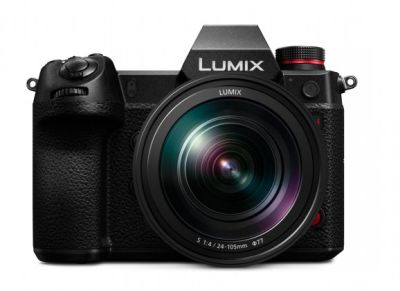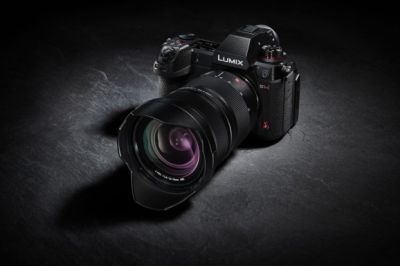Panasonic launches new LUMIX S1H with Cinema-Quality Video and World’s First 6K/24p (3:2) Recording Capability
Panasonic is proud to announce the launch of LUMIX S1H, a new mirrorless camera equipped with a full-frame image sensor to combine professional-level video quality with the high portability of mirrorless system cameras. As previously announced during its development, the LUMIX S1H is the world’s first full frame camera capable of video recording at 6K/24p *1 (3:2 aspect ratio), 5.9K/30p (16:9 aspect ratio), and 10-bit 60p 4K/C4K. *2 *3

Its newly developed 24.2-megapixel full-frame image sensor features an improved version of Panasonic’s Dual Native ISO. In combination with optimum signal processing by the camera’s Venus Engine processor, it achieves high sensitivity with minimal noise across an expansive range of ISO settings. The LUMIX S1H provides 14+ stops of dynamic range as well as V-Log / V-Gamut that are compatible with the popular “VariCam Look” colorimetry. What makes the LUMIX S1H extra special is its unlimited recording time in all recording modes, thanks to Panasonic’s unique heat dispersion technologies. HDR (High Dynamic Range) in HLG (Hybrid Log Gamma), 4:2:2 10-bit HDMI output, and Anamorphic 4:3 modes are also available together with a variety of practical tools for film making, such as tally lights, a waveform monitor and a V-Log View Assist function.
The LUMIX S1H incorporates a Body I.S. (Image Stabiliser) to effectively compensate for hand-shake movement. Combining the Body I.S. (5-axis) and the O.I.S. (Optical Image Stabiliser, 2-axis) in the LUMIX S Series lenses, the Dual I.S. 2 compensates even more powerfully for virtually any type of camera-shake, allowing the use of a 6.5-stop*4 longer shutter speeds. The new rear monitor, real view finder and status LCD are all large displays offering high resolution and high visibility, and the camera’s rugged design provides the professional-level reliability working photographers need.
The LUMIX S Series cameras use the L-Mount system to provide professional photographers with a diverse and future-proof range of products. More than 45 L-Mount interchangeable lenses, including over ten LUMIX S/S PRO lenses, will be available from Panasonic, Leica and SIGMA by the end of 2020. A variety of mount adapters/converters further expand the opportunities to use an even wider range of modern and legacy lenses. The L-Mount thereby opens up an almost limitless spectrum of new creative possibilities.
The S1H will be available to purchase for RRP £3,599.99 (€3999.99 Ireland) from 19th September 2019.
*1 As a full-frame digital interchangeable lens system camera, as of August 27, 2019. Panasonic research.
*2 As a full-frame digital interchangeable lens system camera, as of August 27, 2019. Panasonic research. In Super 35mm-equivalent size.
*3 Corresponding to 4K (4096×2160) as defined by Digital Cinema Initiatives (DCI).
*4 Based on the CIPA standard [Yaw/Pitch direction: focusing distance f=105mm when S-R24105 or focusing distance f=200mm when S-R70200 is used.] Firmware must be updated to the latest version.
Cinema-quality video recording performance
Outstanding video recording capability is the greatest feature of the LUMIX S1H, making it a professional tool for high-end film making.

The S1H features a 24.2-megapixel 35mm full-frame CMOS sensor (35.6 mm x 23.8mm) that’s capable of capturing 6K resolution video and still images measuring 6,024 x 4,016 pixels. The adoption of an OLPF (Optical Low Pass Filter) suppresses moiré, which is especially important in video, while optimal signal processing by the Venus Engine assures a maximum ISO 51200 high sensitivity for recording in low light with minimal noise.
One of the unique features of the LUMIX S1H is its dual native ISO sensitivity – a technology first introduced in Panasonic’s flagship VariCam line-up. It utilises a process that allows the sensor to be read in a fundamentally different way and to extract more information without degrading the image. The result is a camera that can switch from a standard sensitivity to a high sensitivity with almost no increase in noise or other artefacts. Dual Native ISO gives cinematographers a greater variety of artistic choices as well as the ability to use less light on the set, thus saving time.
The LUMIX S1H’s Dual Native ISOs are 640 and 40001, which will allow cinematographers to shoot in almost any lighting environment. Normally noise increases as sensitivity rises with a single native ISO image sensor. However, the new image sensor with Dual Native ISO in the S1H minimizes noise generation by choosing the optimum circuit to use before gain processing, according to the ISO sensitivity set by the photographer. The technology allows remarkably clean recording even at the maximum ISO 51200 setting. This Dual Native ISO feature can be switched manually between LOW (ISO 640-5000) and HIGH (ISO 4000-51200), or left in AUTO mode for the camera to make the decision for you.1
Maximising the resolution of the full-frame image sensor, the LUMIX S1H can achieve 6K/24p, 5.4K/30p (3:2 aspect ratio) or 5.9K/30p (16:9 aspect ratio) high-resolution, smooth video recording for the first time in the world*2. It is also the world’s first full-frame digital interchangeable lens system camera to enable 10-bit 60p 4K/C4K *3*4 HEVC video recording when using an image area equivalent to Super 35mm. Users will benefit from 4:2:2 10-bit 4K30p recording in H.264 with footage captured from the full area of the sensor. The high-resolution data recorded by the 6K sensor can also be used for creating 4K videos with higher image quality or for cropping images for 4K output.
Dynamic range is a measure of the extremes of brightness a digital camera’s sensor can capture in a single exposure. The LUMIX S1H delivers 14+ stops of Dynamic Range – which is virtually the same as the Panasonic Cinema Cameras – to precisely reproduce detail from very dark and very bright areas.
The ability to capture accurate colours and rich skin tones is a must for any filmmaker. The LUMIX S1H imports the renowned colorimetry of the VariCam line-up of cinema cameras, and offers V-Log/V-Gamut capture to deliver a high dynamic range and broad colours. V-Log renders a very flat image to retain maximum colour and brightness information within the image, providing a greater level of flexibility when the images are put through post-production processes. The CMOS sensor of the LUMIX S1H achieves a wide colour gamut known as V-Gamut. This is the S1H’s optimum colour space and is a wider colour space than BT.2020. V-Log has log curve characteristics that are somewhat reminiscent of negative film and V-Gamut delivers a colour space even larger than film.
HDR (High Dynamic Range) video recording is available, which reproduces both the bright parts and dark parts of an image, making it look just like it is seen by the human eye. The camera records video with a designated gamma curve compatible with ITU-R BT.2100, and the user can now select Hybrid Log Gamma (HLG) in the Photo Style menu.
The LUMIX S1H is capable of 4:2:2 10-bit 4K 60p/50p HDMI output, and accommodates a variety of recording formats to meet professional needs, including 4:3 Anamorphic modes.
The VFR (Variable Frame Rate) lets users record over-cranked / under-cranked video in C4K/4K (60fps, maximum 2.5x slow motion in 24p) and FHD (180fps, maximum 7.5x slow motion in 24p). The minimum frame rate for quick motion video is 2fps. In addition, HFR (High Frame Rate) video with sound is also recordable with active auto focus. A variety of effects are available for producing a slow motion video through the post-production process.
Practical tools like a Waveform Monitor and V-Log View Assist are also available. Tally lights are positioned on both the front and rear of the camera to indicate when it is recording, which is useful in multiple camera setups.
*1 When recording mode is set to V-Log. The sensitivity varies depending on the recording mode.
*2 As a full-frame digital interchangeable lens system camera, as of August 27, 2019. Panasonic research.
*3 As a full-frame digital interchangeable lens system camera, as of August 27, 2019. Panasonic research. In Super 35mm-equivalent size.
*4 Corresponding to 4K (4096×2160) as defined by Digital Cinema Initiatives (DCI).
High reliability to support professional work
The LUMIX S1H integrates Body I.S. (Image Stabiliser) for powerful camera-shake and vibration correction. Panasonic has developed an algorithm that precisely calculates shake using information acquired not only from a gyro-sensor, but also from the image sensor and an accelerometer sensor within the body of the camera. This enables more accurate shake detection and compensation, making it possible to use shutter speeds 6EV slower1 than would normally be recommended for any lens/shutter speed combination. Combining the Body I.S. (5-axis) in the camera and the O.I.S. (Optical Image Stabiliser, 2-axis) in the LUMIX S Series lens, the 5-axis Dual I.S. 2 compensates for larger movements than are controllable by conventional methods. Maximizing both O.I.S. and B.I.S. for 6.5-stops of compensation2 is highly beneficial with telephoto lenses and in adverse situations such as in low-light or when one-handed shooting. The 5-axis Dual I.S. 2 works for both photo and video modes, including 4K, 6K and anamorphic recording. The Body I.S. compensates for camera movement even when L-Mount lenses without O.I.S. are used and when other lenses are fitted via an adapter.
To achieve stable, continuous and extended video recording heat dispersion is a crucial issue. Based on the accumulated study of heat simulation through the development of both professional cinema cameras and digital still cameras, Panasonic has designed a near-silent cooling fan with an innovative structure that efficiently draws heat away from the sensor of the LUMIX S1H to support its limitless video recording capability.
To be tough enough to withstand heavy field use, the main structure of the S1H is composed of magnesium alloy with full die-cast top/front/rear frame. Robust construction and a seal for every joint, dial, and button make the LUMIX S1H not only splash resistant3 and dust resistant3 but also freeze resistant down to -10 degrees Centigrade. The durable shutter unit is also tested for approximately 400,000 cycles.
The LUMIX S1H is equipped with a double SD memory card slot, compatible with the high-speed, high-capacity UHS-II and Video Speed Class 90. Users have the flexibility to choose the recording method from Relay Recording, Backup Recording or Allocation Recording which enables the saving of video and photo data on separate cards. The 7.4-V 3,050mAh high-capacity battery achieves a long recording time of approximately 2 hours in all recording modes*4. The battery can be quickly charged via USB PD (USB Power Delivery) using the bundled USB3.1 Type-C cable. The battery charger also complies with USB PD and enables quick power charging in approximately two hours. The camera can be used while charging via this adaptor.
*1 Based on the CIPA standard [Yaw/Pitch direction: focusing distance f=50mm, when S-X50 is used.]
*2 Based on the CIPA standard [Yaw/Pitch direction: focusing distance f=105mm when S-R24105 or focusing distance f=200mm when S-R70200 is used.] Firmware must be updated to the latest version.
*3 Dust and Splash Resistant does not guarantee that damage will not occur if this camera is subjected to direct contact with dust and water.
*4 When the battery is fully charged. The recordable time varies depending on the shooting condition and settings.
Expandability for creative freedom
The LUMIX S1H offers 4:2:2 10-bit 4K 60p/50p HDMI output via a Type A terminal that allows the included cable-lock holder to be used to prevent accidental unplugging and interruptions to recording.

It is also compatible with Time Code IN/OUT synchronization through the flash synchro terminal and comes bundled with a BNC converter cable and BNC cable. This makes it easy to synchronise the non-linear editing of footage shot with multiple cameras.
A variety of accessories can be used for the LUMIX S1H in common with the S1R and S1 – a Microphone Adaptor (DMW-XLR1), Remote Shutter (DMW-RS2), Eyecup (DMW-EC6), Battery Grip (DMW-BGS1), Battery Charger (DMW-BTC14) and so on. The Microphone Adaptor is a hotshoe-mounted adaptor for up to two XLR microphones to record high-quality stereo sound. Dedicated switches allow direct, quick control, and MIC, LINE and CONDENSER MICROPHONES are switchable.
The conventional External Flash (DMW-FL580L / FL360L / FL200L) can also be mounted on the LUMIX S Series cameras.
Compatibility with Bluetooth 4.2 (called BLE: Bluetooth Low Energy) enables constant connection with a smartphone/tablet with minimum power consumption. The settings of a LUMIX S1H camera can also be copied and transmitted wirelessly to other S1H cameras when using multiple S1H cameras. The camera uses Wi-Fi 5-GHz (IEEE802.11ac)1 in addition to 2.4-GHz (IEEE802.11b/g/n.) for a secure and stable connection not only with a smartphone/tablet but also with other devices on location for smooth remote control. The transmission speed of photo/video data is also increased by using the 5-GHz band1. The LUMIX Sync application for iOS2/Android3 devices enables photo transmission to a smartphone or a tablet via easy wireless connection. It also allows remote control of the camera using these devices.
The LUMIX Tether software application enables tethered shooting via USB. Users can control the camera in the studio or on location by connecting it to a PC via USB, and the software allows live image preview on the larger screen, control of multiple settings as well as direct download of the images as they are shot.
*1 5GHz Wi-Fi is not available in some countries.
*2 iOS is a trademark or registered trademark of Cisco in the U.S. and other countries and is used under license.
*3 Android and Google Play are trademarks or registered trademarks of Google Inc.
High operability for intuitive control
The LUMIX S1H employs three large, high-resolution displays for smooth preview, confirmation of images and shooting information on the spot.
The 3.2-inch, 2,330K-dot 3:2 aspect rear touch-screen monitor features approximately 150% higher luminance compared with the LUMIX S1R/S1, GH5 and GH5S for improved visibility when the camera is used outdoors in bright conditions. Adopting a new mechanical structure, the rear display achieves both tilt and rotation movement so that users can easily change angles without unplugging or clashing with HDMI and USB cables.
Live View Boost is another practical feature that makes it possible to check composition even in total darkness by boosting screen brightness just for live view. The S1H also incorporates a Night Mode that provides more moderate backlighting so the user’s eyes don’t have to adjust to comfortably see a subject right after viewing the monitor in dark situations.
The LVF (Live View Finder) is a key factor in achieving the ultra-high-speed response of the LUMIX S1H. The camera has the same top-grade Real View Finder as the S1 and S1R, which boasts the world’s highest resolution of 5,760k dots. The 0.78x magnification ratio can be switched to 0.7x or 0.74x according to the shooting situation, and the use of a high-speed, high-precision OLED for the LVF provides a smooth display that refreshes at 60fps/120fps (switchable). The EVF has a high-speed response, with a lag of approximately 0.005 sec, as well as 10,000:1 high contrast for exceptional clarity. With minimal distortion and high optical performance, this Real View Finder provides a natural view like that seen with the naked eye. It is always sharp and clear from the centre all the way to the corners.
The new Status LCD information panel on the top plate is the largest-in-class, measuring 1.8-inch and offering very high resolution. Adopting MIP (Memory In Pixel technology), it consumes very little power so is able to be kept on even when the camera is switched off. It shows the recordable time for video, number of images remaining and battery level with a black/white switchable background. It assures high visibility both in bright outdoor and in dark situations thanks to a reflective LCD that can be backlit. Major settings for photo shooting or video recording are displayed. The response of the LCD is also fast enough for time code counting and audio monitoring.
The LUMIX S1H has multiple Fn (function) buttons on the front panel of its body that allow quick access to the designated functions. An additional video button is positioned on the lower part of the left of the camera front so the user can also activate recording with the left hand when the right hand is occupied, with holding a cage or gimbal for example. Most of the buttons can be customised to assign the camera’s functions to suit the photographer’s operating style and needs.
High performance photography in stills mode
The LUMIX S1H is not just a high-quality video camera, it is also capable of producing stunning still images in 14-bit RAW format for precise reproduction of colour, tone and detail.
Taking full advantage of its high-resolution sensor, the LUMIX S1H offers High Resolution mode that faithfully captures the tiniest details in beautiful, highly-realistic RAW and/or JPEG images. Eight images are recorded automatically while the camera shifts its sensor via the Body I.S. (Image Stabiliser) mechanism. The images are internally combined using the latest high-speed Venus Engine to create a 96-megapixel equivalent (12,000 x 8,000-pixel) picture. This magnificently high-resolution mode is ideal for of stationary subjects using a tripod, such as landscape and fine art photography. However, a Motion Blur option in the High Resolution menu also allows it to be used in situations where there are moving elements in the scene.
Panasonic has achieved a high-speed AF system using its advanced technology in its lens, sensor and imaging engine. The lens and sensor communicate at a maximum 480fps, and combining Contrast AF with DFD technology, the LUMIX S1H realizes an ultra-high-speed, high-precision AF of approximately 0.08 sec1. The LUMIX S1H also boasts high-speed burst shooting at 9fps (AFS) or 6fps (AFC), and with its high subject-tracking performance it never loses the target subject. As a camera that excels in low-light shooting, the LUMIX S1H boasts -6EV2 luminance detection performance with Low Light AF thanks to the higher sensitivity and optimised tuning of the sensor. Face/eye detection technology makes it possible to capture people in crisp focus, as eye AF even detects the subject’s pupil and precisely focuses on it for impressive portrait shooting. The LUMIX S1H also incorporates Advanced AI Technology that detects specific subjects, such as humans and fast-moving animals, including canines, felines and birds. The camera keeps tracking these subjects even when they turn their back to the camera.
For more continuous burst shooting 6K PHOTO*3 makes it possible to capture unmissable moments at 30fps, by extracting the frame with the best timing out of a 6K burst file (in 4:3 or 3:2 aspect ratio) to save as an approximately 18-megapixel equivalent high-resolution photo. 4K PHOTO enables 60fps high-speed captures in approximate 8-megapixel equivalent resolution. In 6K PHOTO/4K PHOTO users have a choice of three modes depending on the situation; 6K Burst/4K Burst, 6K Burst (Start/Stop)/4K Burst (Start/Stop) and 6K Pre-burst/4K Pre-burst. Users can choose the most suitable burst shooting mode in addition to the regular consecutive shooting mode in full resolution depending on the situation.
The HLG4 Photo mode is a whole new style of photo expression that provides a wider dynamic range to reproduce light and shadow information with more natural contrast. HLG Photos can also be produced as an HSP file5 with compressed high-brightness signals in its full resolution (5,888 x 3,312 in 16:9 with the LUMIX S1H) in addition to JPEG/RAW files. It excels in the expression of lights, such as sparkling starlight or glaring sunlight. The user can play back these vibrant images on the latest Panasonic HLG-compliant 4KTV via HDMI cable connection or other HLG-compliant devices. It is also ideal for photo presentations by photographers.
The high-precision shutter unit offers a high shutter speed of 1/8000 second to capture spur-of-the-moment, fast-moving subjects and to use a high-speed lens with a fully open aperture even outdoors for impressive defocusing. The external flash can be synchronized with the industry’s fastest shutter speed of a maximum 1/320 second.67
The Highlight Weighted Light Metering Mode meters light with the priority on highlighted parts, to prevent detail from burning out.
*1 11EV, at wide-end with S-R24105 (CIPA) in LVF120fps setting.
*2 At ISO100, F1.4, AFS
*3 6K PHOTO’ is a high speed burst shooting function that cuts a still image out of a 4:3 or 3:2 video footage with approx.18-megapixel (approx. 6000 x 3000 effective pixel count) that the 6K image manages.
*4 “HLG (Hybrid Log Gamma)” is an international standard (ITU-R BT.2100) HDR format.
*5 “HSP” is an HDR picture format using HLG format video technology.
*6 The guide number decreases when the shutter speed is set to 1/320 of a second.
*7 As a Digital Single Lens Mirrorless Camera, as of August 27, 2019. Panasonic research.
•L-Mount is a trademark or registered trademark of Leica Camera AG.
•Wi-Fi® is a registered trademark of Wi-Fi Alliance®
•The Bluetooth® word mark and logos are registered trademarks owned by Bluetooth SIG, Inc. and any use of such marks by Panasonic Corporation is under license. Other trademarks and trade names are those of their respective owners.
•SDXC and SDXC Logo is a trademark of SD-3C, LLC.
•Design and specifications are subject to change without notice.








